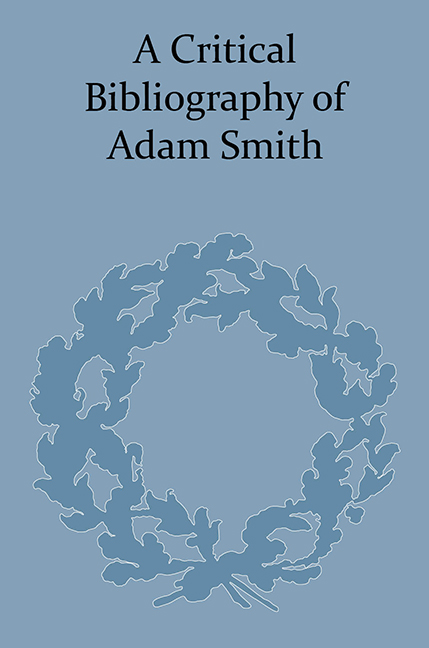Book contents
- Frontmatter
- CONTENTS
- Acknowledgements
- General Introduction
- Early Editions of Adam Smith's Books in Britain and Ireland, 1759–1804
- Adam Smith in English: From Playfair to Cannan
- The Glasgow Edition of the Collected Works of Adam Smith
- The Diffusion of the Work of Adam Smith in the French Language: An Outline History
- The German Reception of Adam Smith
- Adam Smith in Russian Translation
- The Reception of Adam Smith's Works in Poland from the Eighteenth to the Twentieth Centuries
- Adam Smith in the Spanish- and Portuguese-speaking World
- Translations of Adam Smith's Works in Japan
- Adam Smith in China
- Notes to the Bibliographies
- Main Bibliography: All Editions, Chronologically Ordered
- Bibliography by Individual Work
- Bibliography by Language Group
- Note on Dutch Editions
- Note on Italian Editions
- Note on Romanian Editions
- Index
Adam Smith in China
- Frontmatter
- CONTENTS
- Acknowledgements
- General Introduction
- Early Editions of Adam Smith's Books in Britain and Ireland, 1759–1804
- Adam Smith in English: From Playfair to Cannan
- The Glasgow Edition of the Collected Works of Adam Smith
- The Diffusion of the Work of Adam Smith in the French Language: An Outline History
- The German Reception of Adam Smith
- Adam Smith in Russian Translation
- The Reception of Adam Smith's Works in Poland from the Eighteenth to the Twentieth Centuries
- Adam Smith in the Spanish- and Portuguese-speaking World
- Translations of Adam Smith's Works in Japan
- Adam Smith in China
- Notes to the Bibliographies
- Main Bibliography: All Editions, Chronologically Ordered
- Bibliography by Individual Work
- Bibliography by Language Group
- Note on Dutch Editions
- Note on Italian Editions
- Note on Romanian Editions
- Index
Summary
2001 was the centenary of the publication of the first Chinese edition of Wealth of Nations (under the Chinese title Yuan Fu, or The Origin of Wealth), translated by Yan Fu, an outstanding representative of China's Enlightenment. Yan Fu's contribution was commemorated during the Annual Meeting of Chinese Economists at The Research Center of Chinese Economy, Beijing University, where the importance of Wealth of Nations for China's transformation to a market economy was emphasised. It was certainly gratifying that the meeting was organised by young Chinese economists; when I presided over the session, I stressed how important to China's modernisation that this important work of the European Enlightenment was, reminding those attending of the importance of discriminating between Smith's economic liberalism and modern New Classical economic liberalism.
Two new translations of Wealth of Nations were published at around the same time. One was translated by Professor Xie Zong-lin and Li Hua-xia and appeared in June 2000; this edition was clearly critical of the former Chinese version of Wealth of Nations. The other was translated by Professor Yang Jingnian in Nankai University, and published in January 2001. Professor Yang's aim was to ‘show the book's impact upon world history’, and he added Schum-peter's introduction to Wealth of Nations from his History of Economic Analysis.
Thus it can be seen that after one hundred years ‘Adam Smith in China’ is again in the ascendant. With the development of China's market economy and the intensification of the contradictions in modem New Classical economic liberalism, I believe that Smith's social philosophy and political economy will have a great impact upon China's modernisation.
The Spread of Wealth of Nations in China
Yan Fu (1853–1921), the first and the most outstanding representative of those who introduced Western Enlightenment thought into China, was Wealth of Nations' first Chinese translator. He entered a naval school in his early teens to study Western naval technology, and at the age of 25 he was sent to study in England, where he became acquainted with English society and the ideas of Enlightenment thinkers and their successors, such as Montesquieu, Adam Smith, Jeremy Bentham, Charles Darwin and T. H. Huxley.
- Type
- Chapter
- Information
- A Critical Bibliography of Adam Smith , pp. 209 - 218Publisher: Pickering & ChattoFirst published in: 2014

